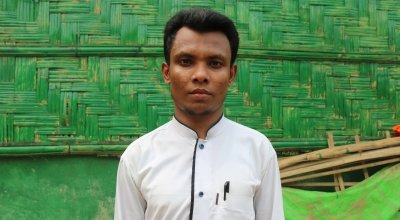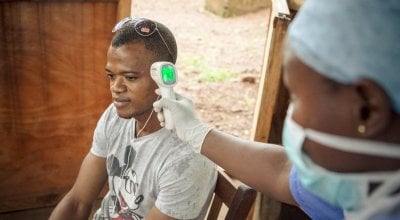
Read our 2024 annual report

Knowledge Hub
A major rebuild of 426 homes in just two weeks was carried out by Concern Worldwide after a massive fire destroyed a large part of a city slum in one of the poorest countries in the world.
Hundreds of residents in the Kroo Bay coastal community in Freetown in Sierra Leone on Africa’s west coast, took part in the emergency housing response, which saved 1,385 people, including 601 children, from having to sleep rough.
Dubliner Eoin O’Donnell, who is our Programme Manager in Sierra Leone, managed the project and confirmed that almost everyone was able to move into their new homes within two weeks, when the main body of the structures, including the walls and roofing, were finished.
Our staff then spent nine further weeks giving follow-up support to the community and helping residents to make the final finishing touches to each property, such as the completion of works to doors and windows.
We had to respond, and quickly, before the monsoon rains came. There were families sleeping on the burnt ruins of their homes. Heavy rains were due and this was an area that was extremely difficult for any vehicle to access, so the task was very challenging.
Getting started
The team worked with local government and the community to achieve the rebuild as quickly as possible, moving over 470,000kg (or 81 truckloads) of building materials over a two-week period starting on St Patrick's Day on 17 March.
Much of the building materials were carried to the site by hand.
The total rebuild cost came to €190,264, or an average of €446 per home, which was donated by The Start Fund, a humanitarian emergency response funding pool supported by Ireland and other European governments.
The materials used included zinc sheets for walls and roofing, bush sticks for structural support, timber, nails and cement.
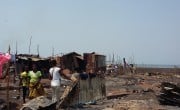
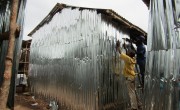
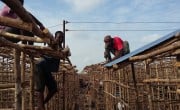
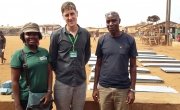
Training and shelter kits
Victims of this sudden homeless crisis in Kroo Bay registered their details with us and were then provided with the “shelter kits” they needed to rebuild. They were trained and helped by the staff and members of the community throughout the construction project.
The rebuild was in response to an inferno that swept through the Kroo Bay community on 4 March, destroying hundreds of homes.
Incredibly, there were no reported deaths from the blaze and just three people sustaining minor injuries. Officials investigating the fire believe it was caused by a mosquito coil, which is a curled aromatic incense stick that is lit to release insect repelling smoke.
The fire made headlines in the UK on 10 March when Britain’s Duchess of York, Sarah Ferguson, spoke of her devastation for the over 1,000 people affected. The tragic incident took place just weeks after she had visited the impoverished area, where she said that many make a living looking for valuables in a vast rubbish dump.
Veronica Williams, a single mother-of-four who lost everything in the fire, said she was overwhelmed with the support given to the community.
The entire Kroo Bay area has an estimated population of around 11,000 and the fire left about 12 per cent of the community homeless, but they are all now living in their rebuilt homes.
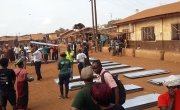
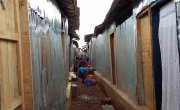
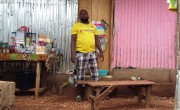
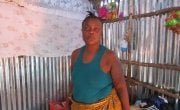
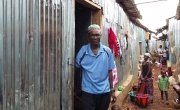
Long-term recovery
We also responded to a separate non-fatal fire on March 8 that swept through the Susan’s Bay slum in Freetown, affecting 120 homes.
Staff provided shelter equipment to help the Catholic Relief Services and Caritas aid agencies with their response to the aftermath of that blaze.
Sierra Leone, which won independence from Britain in 1961, has been attempting to rebuild since the end of a brutal 11-year civil war in 2002. It was also devastated by a major Ebola outbreak from 2014 to 2016 that infected and killed thousands of people – and it remains vulnerable to natural disasters like the mudslides that killed over one thousand people in 2017.
The country is generally peaceful today and is trying to develop its economy, but remains extremely poor and was one of the worst scoring countries in the 2018 Global Hunger Index and one of six highlighted as having “alarming” hunger levels.
We have been working in Sierra Leone since 1996 and employ 244 staff in the country. Our work is currently focused on running development programmes in Port Loko, Tonkolili District and in the Freetown/Western Area. We aim to tackle all dimensions of poverty in Sierra Leone, focusing on the overlapping areas of health, education and livelihoods while maintaining our response to emergencies – like the recent fires and the Ebola outbreak in 2014-2016.



